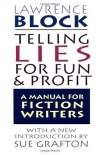Manual For Fiction Writers by Block, Lawrence (classic books to read .TXT) 📗

Book online «Manual For Fiction Writers by Block, Lawrence (classic books to read .TXT) 📗». Author Block, Lawrence
Similarly, I've become more interested than ever in what other writers have to say about writing, whether they're discussing their writing methods, offering tips, or commenting upon the nature of the profession. I'm forever clipping things?and, more often than not, losing the clips.
Once or twice a year WD's capable Rose Adkins writes me a plaintive note asking for a list of my prospective column topics for the next however many months. Once or twice a year I try to make her understand that I could more easily supply maps of the far side of the moon. More often than not, I complete each column convinced I'll have to give up the job, that I'll never again be able to come up with a viable theme for a column. Somehow within the next thirty days a topic suggests itself and I find a way to approach it. I've learned to take it on faith that this will happen.
Ê
Even more than writing in general a monthly column is a two-way street. From the column's inception I have received letters in a steady stream?letters offering suggestions, letters seeking advice, letters thanking me or calling me to task for something I did or didn't say. Both the volume and the fervor of this correspondence continually impress me with just how important all of this business of stringing words together is to all of us who do it. Whatever our degree of commercial or artistic success, whether we be fresh as paint or older than rust, writing appears to be an imperative.
Letters from readers often furnish me with ideas for future columns. Equally important, the feedback they constitute keeps me in touch with my audience and with my material. I read every letter I get, and I reply to most of them. I almost always reply to those accompanied by a stamped self-addressed envelope. A word to the wise-
This present volume had its origin in correspondence. Any number of readers have written suggesting that my columns might be collected and published in book form. While I have to admit that the very same idea did occur to me all by itself, the letters helped assure me that a market for such a book existed.
It has been an interesting experience editing four years' worth of columns for book publication. I have done relatively little editing, largely confining myself to changing column to chapter now and then, and deleting occasional duplications from one column to the next. I have, too, been able to correct mistakes, both grammatical and factual, although I don't doubt for a moment that I have unwittingly left numerous examples of both sort uncorrected.
Sometimes, rereading this material, I've been struck by a tendency to say the same thing over and over. At other times it seems to me that I give conflicting advice from one month to the next. Ultimately I've decided not to apologize for either the redundancy or the contradictions. They strike me as inescapable in material written at various times and from various perspectives.
Ê
Several persons deserve my thanks in this venture. The good people at Writer's Digest, especially John Brady, Rose Adkins, Bill Brohaugh, and publisher Dick Rosenthal, have been unfailingly helpful and supportive since the column's inception. Book publication might not have happened but for the encouragement and enthusiasm of Don Fine of Arbor House; I know no one in the industry who cares more about fiction, or publishes it with greater conviction and respect.
Jared Kieling, my editor at Arbor House, is responsible for the book's scheme of organization. It was he who was able to see that the columns grouped themselves naturally into four general areas?fiction as a profession, as a discipline, as a structure, and as a craft. I embraced this plan wholeheartedly, finding it potentially more useful to the reader than the two organizational modes which had occurred to me?viz., chronologically and alphabetically.
When I write a column, it's impossible for me to know if anyone will find it useful. The nuts-and-bolts columns of Part Four seem to me to offer the most real help to a writer, and yet it is almost invariably the more general inspirational columns which draw the heaviest reader mail. Of course what's helpful and what prompts one to respond may not be the same thing.
In any event, it's similarly impossible for me to know how valuable readers will find this book. I know that it's been enormously valuable to me to write it, column by column, and I have all of you who read it to thank for the opportunity.
New York CityMarch 9, 1981
PART ONE
The Liar's Trade:
Fiction as a Profession
CHAPTER 1
Setting Your Sights
A COUPLE of months ago I returned to Antioch College to teach an intensive week-long seminar on fictional technique. One of the first things I remembered as I crossed the campus was a cartoon which had been displayed on the English Department bulletin board during my first year as an Antioch student. The cartoon showed a sullen eight-year-old boy facing an earnest principal. It's not enough to be a genius, Arnold, the man was saying. You have to be a genius at





Comments (0)